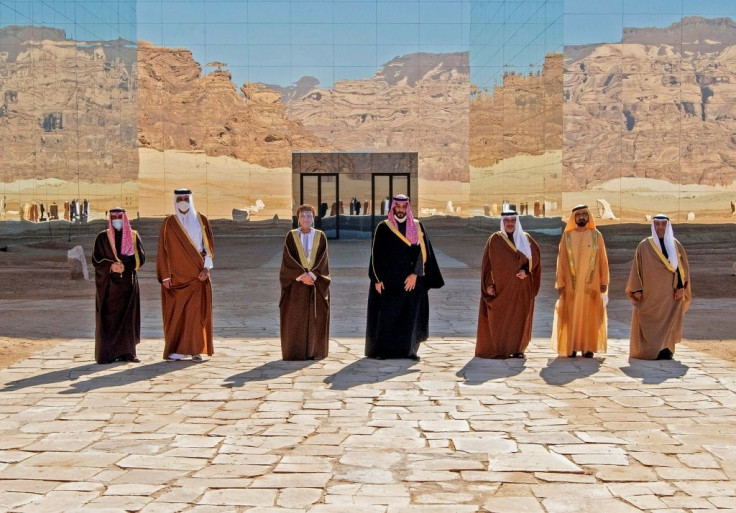Gulf's Surprise Reconciliation Masks Underlying Acrimony
Qatar has been embraced by its neighbours at a landmark summit after over three years of isolation, but the hasty reconciliation did not address underlying resentments which observers say risk resurfacing.
Saudi Arabia, the United Arab Emirates, Bahrain and Egypt in June 2017 slapped a boycott on Qatar that severed air, land and sea links with the gas-rich nation over claims it backed Islamists and was too close to Iran -- charges Doha denied.
But while the Saudi-led quartet agreed to restore relations and lift the restrictions on Tuesday, the talks in the kingdom's desert city of Al-Ula glossed over Qatar's cosy ties with Iran, raising the prospect of tensions erupting again between the Gulf monarchies.
Here are the most pressing questions:
One of the first signs of the thaw was an immediate change in tone from media on both the Qatari and Saudi sides, with habitually aggressive coverage dropped in favour of complimentary tweets and commentary.
But although the border between Saudi and its smaller neighbour may open in the coming days, allowing once-lively trade and tourism to resume, other activity may be delayed due to coronavirus precautions.
"The practical provisions of the agreement are open borders and diplomatic relations in exchange for an end of any hostile (Qatari) messaging -- media, social media, think tanks, and lobbyists against quartet countries," said Cinzia Bianco from the European Council for International Relations.
With regional economies seeking revitalisation after the double hit of coronavirus and an oil price slump, Qatari investments in the formerly hostile countries could follow swiftly said David Roberts, an associate professor at King's College London.
But years of bitter mud-slinging and accusations may not be quickly forgotten.
"The ideological root cause of the conflict will remain while all they do is address the symptoms," said regional analyst Andreas Krieg.
"This is dangerous as this (diplomatic) conflict can erupt again."
While all the boycott nations signed up to the declaration that emerged from Tuesday's summit, there have been varying levels of enthusiasm.
Bahrain, locked in a separate dispute with Doha over maritime boundaries, has held back from effusive statements.
"Bahrain et al will follow," said Roberts. "Evidently they are reluctant, but to defy the Saudi lead here would be unheard of."
The depth of the sanctions, seen by many Qataris as excessive in the closely interlinked region, means "bitterness will remain -- but a new normal will resume," he added.

Wounds inflicted during the crisis could take years to heal.
Eman Alhussein, non-resident fellow at the Arab Gulf States Institute in Washington, said families divided by the crisis would likely be the first to take advantage of eased restrictions, but a restoration of links in other areas "might take time to materialise".
"The severity of the 2017 crisis took many Gulf citizens by surprise. It also underlined the element of unpredictability in the region," she said.
Iran has been at the centre of the dispute as regional tensions with Tehran and its proxies escalate, notably in Yemen where Saudi Arabia and its allies are fighting a grinding war in support of the government against Huthi rebels.
Washington has intensified pressure for a resolution to the Gulf crisis to help isolate Tehran as the curtain falls on Donald Trump's Iran-hawkish presidency.
A middle ground between Doha on one side and Riyadh and Abu Dhai on the other side on this most divisive of regional topics may be hard to find.
Even "Qatar sees Iran's regional activities as dangerous and destabilising," said Royal United Services Institute analyst Tobias Borck.
But "at the same time, maintaining cordial relations with Iran, centred around the management of (their shared) gas field is absolutely and existentially essential for Qatar. So here Qatar is back to walking the tightrope."
Saudi Arabia insisted the deal meant the Gulf family would be better able to combat "the threats posed by the Iranian regime's nuclear and ballistic missile programme", while Tehran congratulated Qatar for resisting "pressure and extortion".
Washington has undertaken a flurry of shuttle diplomacy in the region as Trump's mandate nears completion, with Democrat Joe Biden set to take office on January 20.
Trump's son-in-law and adviser Jared Kushner has led the march on everything from the UAE's and Bahrain's recent normalisation of ties with Israel to ending the blockade on Qatar.
Roberts said the resolution of the Gulf spat meant "Trump can claim that he's a peacemaker".
"Had Biden not been elected and had the Trump team not exercised pressure, Saudi would have not taken this step," said Krieg.
Biden has previously vowed to make Riyadh a "pariah" over its human rights record, prompting Saudi to seek to gain favour with the incoming administration, experts have said.
© Copyright AFP 2024. All rights reserved.





















